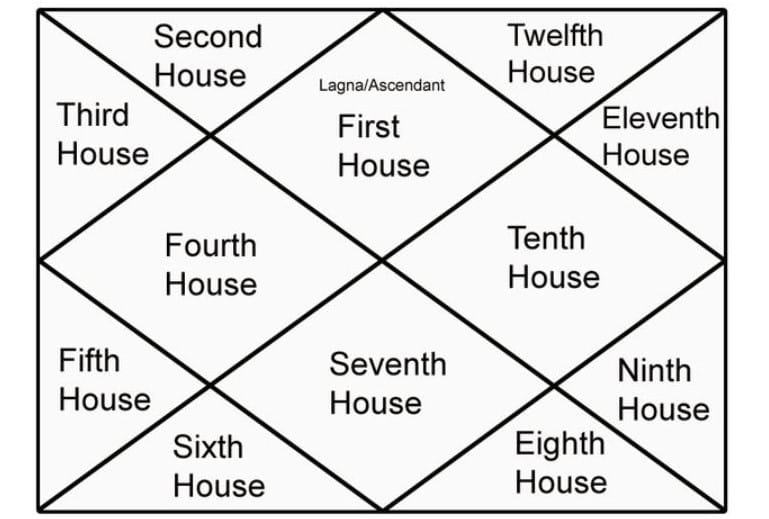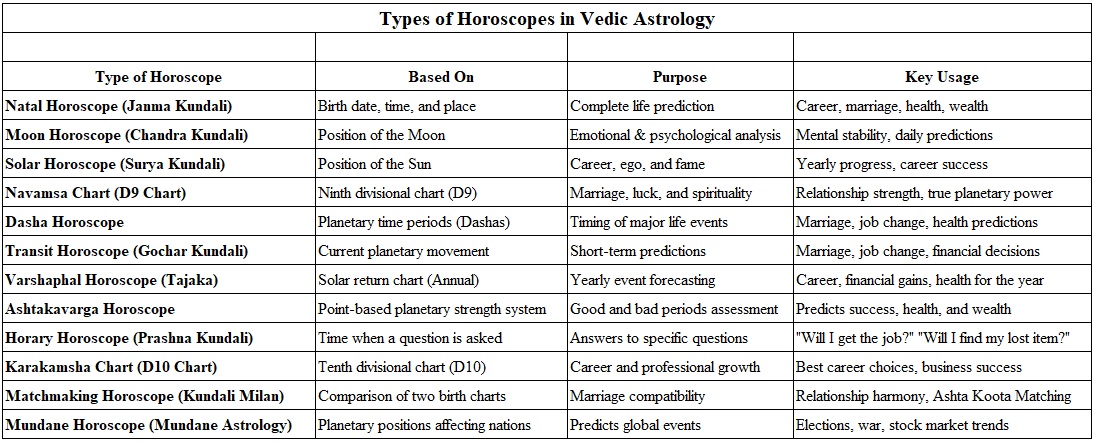Astrology
Type of Horoscope in Vedic Astrology
Introduction to Horoscope in Vedic Astrology
A horoscope, also known as Kundali in Vedic astrology, is a celestial chart that represents the position of planets at the exact time and place of a person’s birth. It serves as a blueprint of life, providing insights into various aspects such as personality, career, health, relationships, and future events. Vedic astrology, or Jyotish Shastra, is an ancient system based on the movement of planets and their influence on human life.
Horoscopes are categorized into different types, each serving a specific purpose. The Natal Horoscope (Janma Kundali) is the most important, offering a complete life analysis. The Moon Horoscope (Chandra Kundali) focuses on emotions and mental well-being, while the Solar Horoscope (Surya Kundali) determines career and success. Other types include the Navamsa Chart (D9) for marriage analysis, Dasha Horoscope for predicting major life events, and Transit Horoscope (Gochar Kundali) for short-term forecasts. Matchmaking Horoscope (Kundali Milan) is used for marriage compatibility, while Mundane Horoscope predicts global events.
By analyzing a horoscope, a person can predict favorable and unfavorable periods. Understanding one’s horoscope helps in making informed life decisions and achieving overall well-being. Following are the different types of horoscopes in Vedic astrology.
1. Natal Horoscope (Janma Kundali)
A Natal Horoscope, also called Janma Kundali, is a birth chart created using a person’s exact date, time, and place of birth. It shows the position of the Sun, Moon, and planets at the time of birth. This horoscope provides a complete picture of a person’s life, including career, marriage, health, financial status, and personality. The most important chart in the Natal Horoscope is the Rashi Chart (Lagna Chart), which determines key life events. Other charts, like the Navamsa Chart (D9), help in deeper analysis, especially in marriage and luck.
It is used to predict life events, strengths, weaknesses, career, relationships, and destiny.
2. Moon Horoscope (Chandra Kundali)
A Moon Horoscope is created based on the position of the Moon in the birth chart. It plays an important role in understanding a person’s mind, emotions, and inner feelings. Since the Moon changes signs every 2.5 days, it has a strong impact on daily moods and thought patterns. In Vedic astrology, Chandra Kundali is used for mental health analysis and daily horoscope predictions.
Key Usage: It helps in understanding emotions, mental stability, mood swings, and how a person reacts to situations.
3. Solar Horoscope (Surya Kundali)
A Solar Horoscope is based on the position of the Sun at the time of birth. The Sun represents self-identity, confidence, leadership, and father’s influence in life. This horoscope is useful for predicting career growth, fame, and long-term success. It also helps in understanding a person’s ego, willpower, and ability to achieve goals.
Key Usage: It is used for career analysis, leadership potential, and yearly predictions.
4. Navamsa Chart (D9 Chart)
The Navamsa Chart, also known as the D9 Chart, is a special divisional chart in Vedic astrology. It provides deep insights into marriage, destiny, and spiritual growth. Even if a planet looks strong in the birth chart, its true strength is determined by checking its position in the Navamsa Chart. This chart is especially important for analyzing marriage life, luck, and hidden potential.
Key Usage: It helps in predicting marriage success, relationship compatibility, spiritual progress, and hidden strengths.
5. Dasha Horoscope
A Dasha Horoscope is based on planetary time periods (Dashas). Each person goes through different planetary periods in life, which decide the timing of major life events like marriage, job changes, financial growth, or health issues. The Vimshottari Dasha system is the most commonly used system, where each planet rules for a specific number of years.
Key Usage: It helps in predicting when major events will happen in life, including career growth, marriage, and financial success.
6. Transit Horoscope (Gochar Kundali)
A Transit Horoscope, or Gochar Kundali, is based on the current movement of planets in the zodiac. Since planets keep moving, their positions affect people differently at different times. For example, when Jupiter transits a favorable house, it can bring financial success, while a bad Saturn transit can cause struggles. Transit charts are used for making short-term predictions and are important for daily, monthly, and yearly forecasts.
Key Usage: It helps in determining the right time for job changes, business success, marriage, travel, and financial decisions.
7. Varshaphal Horoscope (Tajaka)
A Varshaphal Horoscope, also called Tajaka Chart, is an annual horoscope based on the solar return (when the Sun returns to the same position as at birth). It predicts major events in a particular year and is commonly used for New Year predictions. This chart helps in understanding how a person’s career, health, and personal life will progress in the upcoming year.
Key Usage: It is useful for predicting yearly success, financial gains, career progress, and health conditions.
8. Ashtakavarga Horoscope
The Ashtakavarga Horoscope is a unique point-based system that evaluates the strength of planets in different houses. Each planet receives points (0 to 8) in different houses, and a higher score means better results. This horoscope is helpful in finding favorable and unfavorable periods in life.
Key Usage: It is used to assess career success, financial stability, and health risks.
9. Horary Horoscope (Prashna Kundali)
A Horary Horoscope, also called Prashna Kundali, is created based on the exact time and place when a question is asked. It is used when a person does not have their birth details but needs an answer to a specific question. The astrologer analyzes the planetary positions at that moment to provide an accurate response.
Key Usage: It is helpful for answering questions like "Will I get this job?" "Will my lost item be found?" "Will my business succeed?"
10. Karakamsha Chart (D10 Chart)
The Karakamsha Chart, also known as the D10 Chart (Dashamsha), is a divisional chart used for career analysis. While the birth chart gives an overall idea of a person’s profession, the D10 Chart provides deep insights into job success, promotions, and career stability.
Key Usage: It is useful for analyzing career growth, business success, and professional reputation.
11. Matchmaking Horoscope (Kundali Milan)
A Matchmaking Horoscope, or Kundali Milan, is used to check marriage compatibility between two individuals. It is based on Ashta Koota matching, where eight factors (such as Guna matching, Mangal Dosha, and planetary positions) are analyzed to determine whether the couple is compatible.
Key Usage: It helps in assessing love compatibility, relationship success, and marital harmony.
12. Mundane Horoscope (Mundane Astrology)
A Mundane Horoscope is used to predict events related to nations, politics, and global affairs. It is based on the planetary positions at the time of major national events. This type of astrology is useful for forecasting elections, wars, natural disasters, economic trends, and stock market movements.
Key Usage: It is used by politicians, economists, and financial analysts to predict global events.
In short,
Vedic astrology offers various types of horoscopes, each serving a specific purpose. Some of the most important ones include:
1. Natal Horoscope (Janma Kundali) – A birth chart that provides a complete life analysis.
2. Moon Horoscope (Chandra Kundali) – Focuses on emotions and mental well-being.
3. Solar Horoscope (Surya Kundali) – Determines career, fame, and self-identity.
4. Navamsa Chart (D9 Chart) – Analyzes marriage, destiny, and spiritual growth.
5. Dasha Horoscope – Predicts major life events based on planetary periods.
6. Transit Horoscope (Gochar Kundali) – Short-term predictions based on planetary movements.
7. Varshaphal Horoscope (Tajaka) – A yearly horoscope predicting key events.
8. Ashtakavarga Horoscope – Uses a point-based system to assess good and bad periods.
9. Horary Horoscope (Prashna Kundali) – Answers specific questions without birth details.
10. Karakamsha Chart (D10 Chart) – Analyzes career success and professional growth.
11. Matchmaking Horoscope (Kundali Milan) – Determines compatibility for marriage.
12. Mundane Horoscope – Predicts global events, including politics and economy.

